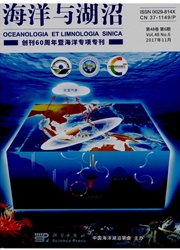

 中文摘要:
中文摘要:
采用环介导等温扩增技术(loop-mediated isothermal amplification,LAMP)进行核酸扩增,凭借横向流动试纸条(lateral flow dipstick,LFD)完成扩增产物检测,建立了可快速检测孔石莼(Ulva pertusa)的LAMP-LFD方法。该方法首先在孔石莼的内转录间隔区序列(internal transcribed spacer,ITS)的8个种内保守区域设计6条特异性引物(上游内引物由生物素标记),进行由生物素标记的LAMP反应;同时,在两条外引物的有效扩增区段内设计1条异硫氰酸荧光素(fluorescein isothiocyanate,FITC)标记的探针,生物素标记的LAMP产物与FITC标记的探针特异性杂交后,在LFD上完成结果显示。优化后LAMP的反应条件为63°C反应50min,加上探针杂交与LFD检测共需60min。结果表明,利用该LAMP-LFD方法可特异性地检出孔石莼,对浒苔(Ulva prolifera)等9种常见藻类的检测均呈阴性。利用该方法最低可检测到3.04×10–2 pg/μL的孔石莼基因组DNA,是以LAMP外引物进行的常规PCR方法的1000倍。针对一定数量的实际样本的检测结果表明,LAMP-LFD方法与传统的形态学观察的结果一致。因此,本研究建立的孔石莼LAMP-LFD快速检测方法,具有特异性强、灵敏度高、操作简便等优点,有望成为我国东部沿海孔石莼快速检测和定期监测的有效技术手段。
 英文摘要:
英文摘要:
We developed a novel LAMP-LFD method for rapid detection of Ulva pertusa based on loop-mediated isothermal amplification(LAMP) integrated with visual detection by a lateral flow dipstick assay(LFD). Six primers were designed according to the conserved regions of internal transcribed spacer(ITS)(among the primers, the forward inner primer was biotinylated) and used in the LAMP assay. In addition, a specific probe was designed based on the conserved sequence amplified by both outer primers, and labeled by fluorescein isothiocyanate(FITC). The biotinylated LAMP amplicons were hybridized exclusively with the FITC-labeled probe and detected via LFD. The optimized LAMP assay to detect U. pertusa was performed at 63 °C for 50 min, and for only 60 min when visualization via LFD is incorporated. The results demonstrate that LAMP-LFD could specifically detect U. pertusa and no characteristic amplification was observed when using genomic DNA of other 9 common algal isolates responsible for green tide or red tide. The detection limit using genomic DNA of U. pertusa was 3.04×10^(–2) pg/μL, which was 1000 times lower than that of the conventional PCR method using both outer primers. U. pertusa could be successfully detected from filed samples by LAMP-LFD, which is coincident with the results obtained by the traditional microscopic examination. Therefore, the LAMP-LFD method is specific, sensitive, and easy, showing great potential in the rapid detection and routine monitoring of U. pertusa in the eastern coast of China.
 同期刊论文项目
同期刊论文项目
 同项目期刊论文
同项目期刊论文
 期刊信息
期刊信息
